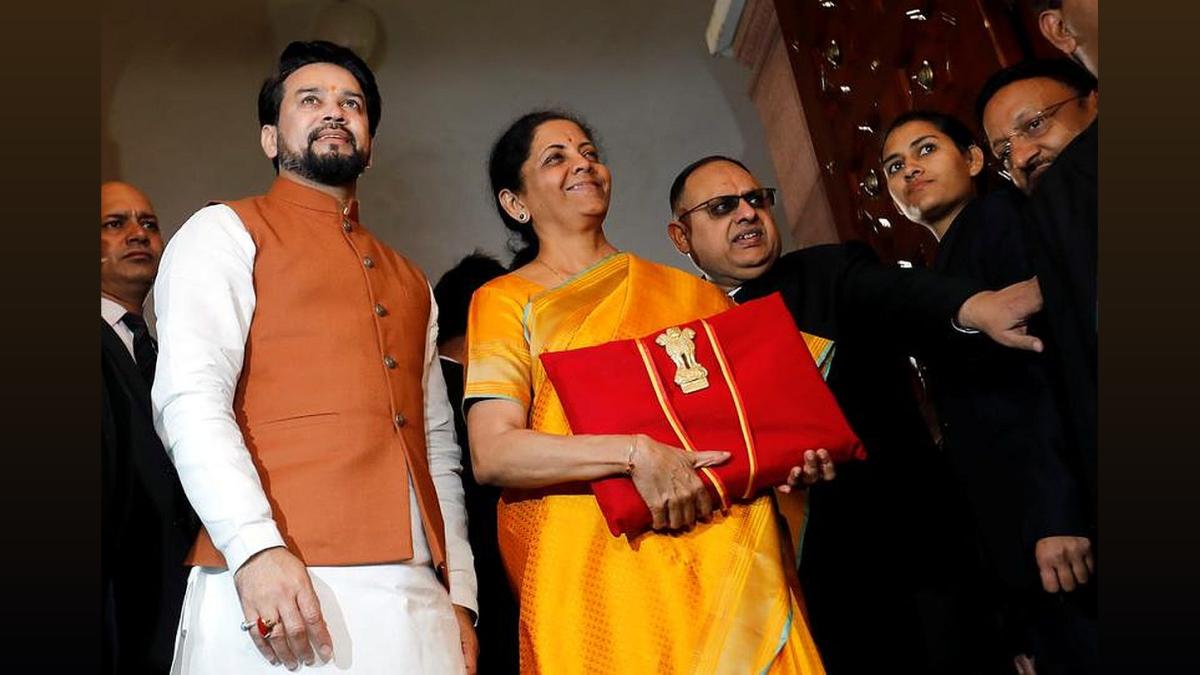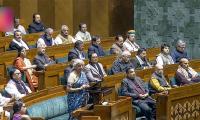India's Interim Budget: USISPF Praises Fiscal Management
The US-India Strategic and Partnership Forum (USISPF) commends India's interim budget, highlighting its focus on responsible fiscal management, infrastructure, and inclusive growth.

Washington, Feb 6 (PTI) Commending Finance Minister Nirmala Sitharaman for her consistency and focus on growth in her interim Budget, a US-based India-centric business advocacy group has said that it represents a welcome statement of responsible fiscal management in an election year.
The US-India Strategic and Partnership Forum (USISPF) also commend the government's continued focus on the trinity of infrastructure, inclusive growth, and fiscal prudence in line with growing US-India commercial ties.
The interim Budget was presented on February 1 by Sitharaman.
As an interim, pre-election budget with no major policy pronouncements, it represents a welcome statement of responsible fiscal management in an election year, the USISPF said in a statement.
General elections are expected to be held in India between April and May.
According to budget projections, the fiscal deficit for the upcoming financial year (2025) will narrow to 5.1 per cent and GDP growth will remain between 6-7 per cent GDP.
On the expenditure side, the government's priorities will remain focused on short-term spending for social protection and job creation, and medium-term growth fueled by enhanced capital expenditure.
We believe these priorities, within the framework of fiscal consolidation, will help strengthen India's macroeconomy, lower government borrowing costs, and support the increased foreign trade and investment that is the foundation of the US-India partnership, the USISPF said.
In line with growing US-India commercial ties, we commend the government's continued focus on the trinity of infrastructure, inclusive growth, and fiscal prudence, it said, adding that the 2024 budget increases capital expenditures, which are critical to maintaining the engine of economic growth, by 11.1 per cent, to USD 133.9 billion.
At the same time, the government has prioritised funding for infrastructure projects, with USD130 billion allocated for roads, rails, ports, and airports.
All of these investments will help attract private investment in these sectors, including foreign direct investment from the United States, it said.
We also recognise and support the important social spending included in the budget, such as the construction of 20 million affordable houses in the next five years, which will give a boost to the rural economy with new jobs and the construction sector, it said.
The group commended the continued steps toward meeting India's clean energy goals, including the project to provide free rooftop solar-generated electricity to 10 million households.
Additional investments in the healthcare, education, and manufacturing sectors, the latter through investments in the PLI schemes, will help attract high-end tech manufacturing and build on resilient supply chains, critical priorities for both Washington and New Delhi, it said.
On the revenue side, the budget eschewed significant tax policy changes, keeping rates steady for the salaried middle class and maintaining a 15 per cent corporate rate through March 2024. We welcome this policy of tax stability, which is a critical support to increased investment and job creation, and hope to see it extended beyond the new fiscal year, the USISPF said.
The US-India Strategic and Partnership Forum (USISPF) also commend the government's continued focus on the trinity of infrastructure, inclusive growth, and fiscal prudence in line with growing US-India commercial ties.
The interim Budget was presented on February 1 by Sitharaman.
As an interim, pre-election budget with no major policy pronouncements, it represents a welcome statement of responsible fiscal management in an election year, the USISPF said in a statement.
General elections are expected to be held in India between April and May.
According to budget projections, the fiscal deficit for the upcoming financial year (2025) will narrow to 5.1 per cent and GDP growth will remain between 6-7 per cent GDP.
On the expenditure side, the government's priorities will remain focused on short-term spending for social protection and job creation, and medium-term growth fueled by enhanced capital expenditure.
We believe these priorities, within the framework of fiscal consolidation, will help strengthen India's macroeconomy, lower government borrowing costs, and support the increased foreign trade and investment that is the foundation of the US-India partnership, the USISPF said.
In line with growing US-India commercial ties, we commend the government's continued focus on the trinity of infrastructure, inclusive growth, and fiscal prudence, it said, adding that the 2024 budget increases capital expenditures, which are critical to maintaining the engine of economic growth, by 11.1 per cent, to USD 133.9 billion.
At the same time, the government has prioritised funding for infrastructure projects, with USD130 billion allocated for roads, rails, ports, and airports.
All of these investments will help attract private investment in these sectors, including foreign direct investment from the United States, it said.
We also recognise and support the important social spending included in the budget, such as the construction of 20 million affordable houses in the next five years, which will give a boost to the rural economy with new jobs and the construction sector, it said.
The group commended the continued steps toward meeting India's clean energy goals, including the project to provide free rooftop solar-generated electricity to 10 million households.
Additional investments in the healthcare, education, and manufacturing sectors, the latter through investments in the PLI schemes, will help attract high-end tech manufacturing and build on resilient supply chains, critical priorities for both Washington and New Delhi, it said.
On the revenue side, the budget eschewed significant tax policy changes, keeping rates steady for the salaried middle class and maintaining a 15 per cent corporate rate through March 2024. We welcome this policy of tax stability, which is a critical support to increased investment and job creation, and hope to see it extended beyond the new fiscal year, the USISPF said.
You May Like To Read
TODAY'S MOST TRADED COMPANIES
- Company Name
- Price
- Volume
- Vodafone Idea L
- 6.96 ( -1.69)
- 32087619
- Spicejet Ltd.
- 45.48 ( -6.38)
- 24487576
- Srestha Finvest
- 0.56 (+ 3.70)
- 15767473
- G G Engineering
- 1.00 ( 0.00)
- 13488004
- YES Bank Ltd.
- 16.20 (+ 0.31)
- 11982994






 © 2025 Rediff.com India Limited. All rights reserved.
© 2025 Rediff.com India Limited. All rights reserved.